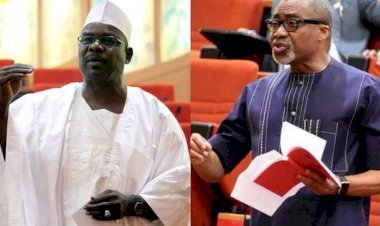Fulani: The Unfinished Work of Danfodio

The Fulani in the past few years are in our minds and news for the wrong reason—the banditry that has plagued the Northwest countryside. In the North today, Fulani in popular parlance connotes the cattle Fulani, whom I humorously classified as Fula naturalis in my 1999 column. Unlike their cousins, the town Fulani—Fula domesticus—who have enjoyed and partook in building civilizations across West and Central Africa, F. naturalis have very limited contact with civilization. Their life is defined by cattle and forest.
The Master
The cow—the master of the F. naturalis—is their sole merchandise and currency. It defines their geography. They follow the master to wherever its interest of pasture and water lead, thus denying them a permanent address or nationality but assuring them over the centuries of an enduring economy that sustains their republican disposition and freedom from political subservience of numerous city states and empires. With the guide of this master, they witnessed the rise and fall of ancient Ghana, Mali, Songhai, Borno and the Hausa States and negotiated the Continent’s savanna forests from Senegal in the West to The Sudan and Ethiopia in the East and Congo in the South.
When they lose the master—or the master loses them—due to natural disaster, war or religion, they become sedentary and morph into the domesticus species. Within the first generation of settling, the F. domesticus integrate into society and engage in civilizational pursuits like trade, scholarship, politics and war. They acquire a new master—the law—which they must obey, as do other peoples, in order to survive and propagate.
The acquisition of a permanent address guarantees them national identities, rights and the opportunity for industry and to indulge in capital accumulation. Thus, since they started to settle in the Chad and Rima basins in the 16th Century, the Fulani became farmers, traders, court clerks, magistrates, local chiefs, emirs and in-laws to millions that are attracted by their morphology, economic status or political position so much so that the Fula DNA today is inextricably embedded the cells of the majority in Hausaland.
Jihad
From the F. domesticus stock came the 19th Century inventor of the Sokoto Caliphate, Shehu Usman Danfodio. The Jihad he waged contributed in unifying Hausaland—for the first time in its history—and opened up for the Hausa and others lands beyond theirs and sustained an order that guaranteed the civilizational opportunities of peace and industry throughout the 19th Century. The F. domesticus, except in towns and the numerous settlements they formed, have become culturally swallowed by the Hausa through the principal agent of Hausanization—the Hausa language. Thus, the ultimate fate of the F. domesticus in Hausaland is the acquisition of a new socio-political identity called Hausa-Fulani or just Hausa as they are collectively regarded by others.
At the advent of his Jihad, Danfodio looked up to the Fulani stock and appealed for their support. The F. domesticus answered his call from all regions of Hausaland, Borno Empire and the Gongola valley. They became his students and bearers of his flag. Within few years, they conquered the entire Hausa states and engaged the mighty Borno in unending battles in the Northeast for the next 100 years. The disciples of Danfodio and his F. domesticus followers enjoyed the benefits of conquests and became rulers of Hausaland and beyond until they were stripped of power by the white man.
A portion of the F. naturalis answered the call of Danfodio to Islam, some to his appeal to kinship and the rest to the promise of prosperity that his conquests started to fulfil. However, their majority who were still pagans, by the accounts of some historians, refused to substitute their master with Danfodio. They stuck to the cow, lived in the forests, paying cattle tax sometimes, and moving farther away from the areas under the effective political domination of the caliphate, avoid the restraints of religion and constraints of the law—the master in the civilizational order commanded by Danfodio and other F. domesticus cousins.
Danfodio was not happy with the rejection from his cousins, the F. naturalis. He abandoned their chase and said, according to oral tradition, “Go and continue to live the life of nomads, in which you will never settle down.” The words of the Shehu took effect. From the highlands of Adamawa to the basins of Chad, Rima, Niger and Benue rivers, the old and new F. naturalis enjoyed the bliss promised by the forest and the wild order associated with paganism. Over they years, many were compelled by circumstances listed above to abandon the master, settle down, embrace Islam and move with civilization. Most, however, remained pagans and nomads until of recent when a new political order in post-colonial Nigeria encroached into the forests.
The New Order
The new order introduced high doses of the downside of civilization—corruption and poverty—and gave back little of its benefits—equity, rights and prosperity. In some places the F. naturalis is denied even dwelling the forest by ascendant forces of ethnic nationalism that finds expression in tribal politics and mass killings. In others, population explosion and desert encroachment have colluded to deprive the forest of pasture and water. In some, still, the entire forests were sold to urban bourgeoisie who want monopoly of its gold and other mineral resources. Such acquisitions usually come with the attendant depopulation of the forest by fomenting crisis to make the areas ungovernable, as we see in most mineral rich regions of the world.
That is how Fula who fled from the theocratic government of Danfodio are today faced with the monster of a government that is set to wipe them out altogether. Their protector—the forest—is itself a victim and their master—the cow—cannot take them anywhere as all forests have come to be within the reach of this monster. They are trapped. They must, as any living thing would do under the dictates of its survival instinct, fight back with all the tools at its disposal. Ignorant of precepts of religion and the refinement of law, the forest species of the Fulani does not respect order. To him everything is about strength. Looting, killings, rapes, whatever, can be employed to revenge or to acquire.
Here lie the foundations of the extreme savage behaviour of the F. naturalis in the ongoing banditry of the Northwest that no Hausa or F. domesticus can ever contemplate. Had they answered the call of Danfodio or had the 19th jihadist had the fortune of taking civilization to the forest zones, this banditry would have never occurred. Had nature today been as generous to the savanna as it was yesterday and kept the desert at bay, had we the civilized lived according to the dictates of civilization and being the disciples of its egalitarian concepts of equity and public interest, the forests would have remained, yielding the promise of prosperity to its natural inhabitants and shielding us from the savagery of its population.
Government
In the task of carrying civilization to the forest population or forcing it down their throat, I see as well defined the roles of different stakeholders, if we are serious about ending the ongoing savagery.
That of government is as clear as daylight. It must enforce the law as much as it can. Nothing must prevent it from applying it on anyone abusing the rights of other Nigerians to live peacefully with their lives and property. No compromise. No excuse. This must be applied without respect to any ethnicity—to the Fulani as it is to the Hausa.
Government must also rush to protect what is left of the forest. That will ameliorate the situation as it will revamp hope of successful free-range husbandry among the forest Fulani. In addition, additional economic benefits can be applied through improving the genetics of the stock and the processing of its products. The animal husbandry component in our agricultural policies, programs and projects need to be scaled up. So far, the Fulani gains nothing from them. I cannot find a single centre where I can acquire a $1 straw of virile semen for artificial insemination of my cows, not even in Vom. Government makes perennial noise about fertilizer but has never cared about animal feed and drugs beyond the demand of poultry conglomerates. Grazing reserves and other facilities needed to sustain the health and virility of our large ruminants which were established between 1960s and 1990s are all abandoned, encroached, dysfunctional and dilapidated. That is not to mention security of their cows and lives of their families which are plundered and killed at advent of every crisis especially in Northcentral Nigeria. The cattle Fulani have been on their own.
The activities of miners that allegedly precipitated this crisis and the unmitigated expansion of agriculture into forest reserves need to be checked by local and state governments. Land grabbing and mineral prospecting without environmental impact assessments that would foresee and avoid the consequences of such commercial activity in our forests must be checked by our state governors and the Federal government. Experts on the crisis in the Northwest have specifically implicated this institutional banditry of the elite as its cause—and it goes unabated in other areas as well.
Government must also undertake mass campaigns of educating the forest Fulani. The nomadic education schools invented in the 1990s are moribund and underfunded today, as all attention from Universal Education Board and its state branches—the SUBEBs—focus on schools amongst sedentary populations. The nomadic schools are abandoned in every state, even in states non-hostile to the Fulani. Education is the principal vehicle of civilization. All the bandits arrested confess to having no education, formal or informal, western or Islamic. And they all fall within the age category that would benefitted from our Nomadic Education scheme.
Government must reach out to the forest populations with campaigns and establish its presence there. Broadcasts over radio in their languages and increasing the presence of law enforcement agents and military encampments will go a long way to effacing the safe haven status of such forest. The presence of government must be felt everywhere. With military and police presence, the availability of modern surveillance and communications technology, the F. naturalis cannot be beyond the reach of government as he eluded Danfodio 200 years go.
Finally, government must also prevail on its agents, especially the police, from exploiting the ignorance and helplessness of the forest Fulani to extort him and deprive him of his property. The cows appeal to the primitive acquisition instincts of police officers. Once they arrest a Fulani, they are sure that they have hit a goldmine that will last them months. This too is among the major grudges of our forest stock. Unfortunately, they are not alone. Other Nigerians daily fall victims of this exploitative practice. It is only worse with the Fulani.
Citizens
The second stakeholder is the Nigerian citizen who comes into contact by address or business with the forest Fulani. In this world, we get what we give. The reaction of the Katsinawa Hausas in Zamfara worsened matters during the early stages of the crisis. Banditry started in the Northeast and Northwest in the mid-1990s and it heightened in the Northeast just after 1999. The northeast approached its purely from the point of view of criminality and its governors controlled it through law enforcement. States like Kano and Kaduna to a large extent also treaded the path of the law and the banditry in places like Falgore forest was stopped.
In Zamfara, however, banditry became ethnicized by the Katsinawa Hausas there. After the police failed to control the banditry, the elites mobilized illiterate village vigilantes who attempted to stop it through meting brutal treatments to the entire ethnic Fulani, not just the suspected culprits. The vigilantes were the law, the police, the judge and the executioners all in one. Settlements were rounded up and massacred; ardos—Fulani leaders—were humiliated before being executed amidst their family members. So collective was this treatment that the Fulani fled the area and migrated southward into the forests of Birnin Gwari and Niger. There, they acquired, and trained in, firearms before returning to their previous homes in Zamfara some few years later. Tam!


















































